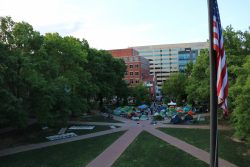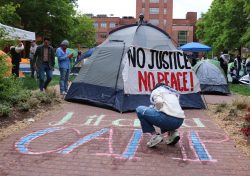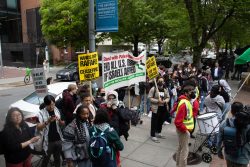Georgetown University played a significant role in U.S.-Afghan relations over the summer by hosting the Afghanistan-America Summit on Recovery and Reconstruction. Top Afghan and U.S. government officials as well as U.S. policymakers and experts convened for the first time in the United States on July 24 and 25 to discuss pressing issues facing Afghanistan’s new government.
Through the summit, the University has continued to expand its involvement in U.S.-Afghan relations.
On Jan. 27, 2002, Hamid Karzai, Chairman of the Interim Government of Afghanistan, spoke on campus about bringing democracy and stability to Afghanistan.
The University remained connected to Afghan leaders and the needs of Afghanistan’s developing government.
Through negotiations with Afghan officials and U.S. leaders, Georgetown helped organize a joint summit for July, with working groups meeting in early June, according to the Blue & Gray, the University’s biweekly newspaper for faculty and staff.
The July summit focused on several issues, including development, trade and commerce; health; education; and women, families and society.
On July 24, the summit split into working groups centered on the specific topics. The following day, Afghan and American speakers addressed the entire group, as well as registered guests, in Gaston Hall.
Many of Afghanistan’s new cabinet members attended the summit, as did the Ambassador of Afghanistan to the United States, Ishaq Shahryar.
U.S. representatives included former senator Bob Dole (R-Kan.), the secretaries of Health and Human Services and Education, and multiple Georgetown faculty members.
University participants shared an enthusiasm for Georgetown’s role in Afghanistan’s progress toward democracy.
“It’s great for the University. It engaged a lot of people within the institution,” said Scott Fleming, assistant to the president for federal relations, who moderated the discussion on reconstruction and finance.
Katie Leonhardy, a professor in the School of Nursing and Health Studies, moderated the health discussion group and said that although time was limited, many important opinions were brought out from different sectors.
“We all want to keep the momentum going ? to do something in addition,” Leonhardy said.
Fleming said that he also saw the summit as a success from the Afghan perspective.
“It established relationships and contacts that will enable [Afghanistan] to build on in the future,” Fleming said.
Jane McAuliffe, Dean of Georgetown College, moderated the second day of the summit where speakers addressed a “packed house.”
McAuliffe said that the summit was important to all participants.
“Every single one of the Afghan and the American delegates with whom I spoke expressed enthusiasm and appreciation for the effort,” McAuliffe said.
Many Georgetown students attended the summit, some serving as ushers, others as guests.
Georgetown University Student Association President Kaydee Bridges (SFS ‘03) was the opening speaker on the second day of the summit.
“Georgetown was the perfect place to have this,” Bridges said. “Everybody knows what the problems are. It’s only when you pick them apart that you find solutions ? You have to take the steps.”
To further its relationship with Afghanistan, the University also proposed a cultural exchange program at Georgetown for Afghan and U.S. college students.
Logistical problems have so far prevented its realization, Assistant Vice President for Communications Julie Green Bataille said.




